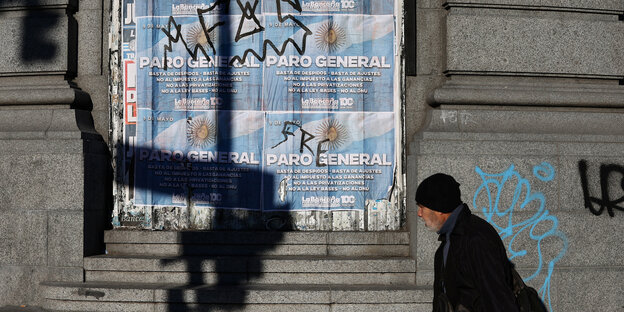Argentines protest against Javier Milei's economic policy with a general strike. The focus is on employee rights and layoffs.

Unions in Argentina had called for a strike with signs – here in the capital Buenos Aires Photo: Agustín Marcarian/Reuters
BUENOS AIRES taz | A general strike paralyzed Argentina on Thursday. The CGT union organization had called a 24-hour strike. The protest was directed against the rigorous austerity policies of libertarian president Javier Milei. It was the second general strike the president faced in his five months in office.
While unions in the capital, Buenos Aires, refrained from holding demonstrations, smaller demonstrations were reported in some cities. Subway and S-Bahn trains remained in stations, planes remained on the ground. Authorities and offices remained closed, as did banks.
The vast majority of public schools were closed, private educational institutions were open. Most supermarkets, shopping centers and stores were open. However, in many places there was a kind of Sunday atmosphere, as many people stayed at home.
Of the 340 bus routes in and around Buenos Aires, almost 50 were in operation, bringing those who wanted to work at least closer to their workplace. Many companies had organized transportation services for their employees.
“This is a general strike by union bosses, not workers,” said one rushing to work as they passed. As if President Milei had heard the ruling, he sent out quick slogans and memes about the strike on Platform X throughout the day.
Resistance to labor law reform
It is difficult to estimate the extent of participation in strikes. Without public transportation, many employees cannot get to work. It is also unclear whether, and how many, their employer forced them to come to work, as the unions claim. In the end, the CGT reached a positive conclusion.
“The success of the strike is due to the fact that it had social and political support. It is a political strike because we are discussing all the measures that harm our country. The government must take note of this to correct its adjustment policy,” explained Héctor Daer, from the union board of directors.
The strike was directed, among other things, against the large legislative package that the House of Representatives approved last week and that is currently being debated in the Senate. In particular, unions criticize the reform of labor legislation contained in it. Introducing a new category of self-employed workers would bypass formal employment contracts and eliminate payment of minimum wages, as well as holiday and Christmas bonuses.
50,000 jobs have already been lost
There are also fears of a wave of layoffs as state-owned companies are privatized to make them more attractive for sale. In the first four months of Milei's term, at least 15,000 state workers lost their jobs because their contracts were not renewed. According to union estimates, around 50,000 jobs have been lost in the private sector.
Data published on Wednesday by the national statistics authority, Indec, shows how dramatic the situation is in each sector. Industrial production is down 21 percent compared to April last year, while construction shows a 42 percent drop over the same period.
The loss of purchasing power of income is also dramatic. While wages and salaries of formal employees increased by almost 58 percent in the first four months after Milei took office, prices increased by 90 percent. Despite formal employment, more and more people can no longer survive on their income until the end of the month.
